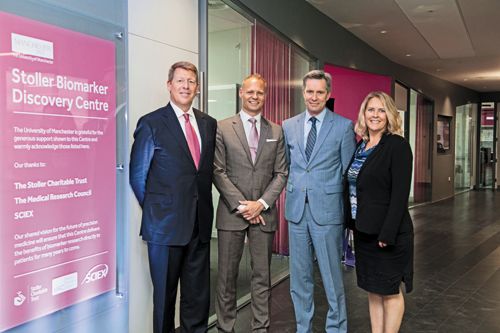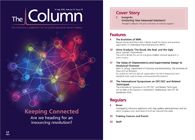The University of Manchester Opens Stoller Biomarker Discovery Centre
The University of Manchester unveiled the £18-million Stoller Biomarker Discovery Centre at the beginning of June 2016. The research centre will focus on biomedical research on major diseases, including cancer, psoriasis, and arthritis, using mass spectrometry (MS)‑based proteomics solutions from Sciex.

The University of Manchester unveiled the £18-million Stoller Biomarker Discovery Centre at the beginning of June 2016. The research centre will focus on biomedical research on major diseases, including cancer, psoriasis, and arthritis, using mass spectrometry (MS)âbased proteomics solutions from Sciex.
The Stoller Biomarker Discovery Centre, which was funded by a philanthropic gift from the Stoller Charitable Trust, the Medical Research Council, and developed in partnership with Sciex, will help to industrialize the process of identifying and utilizing protein biomarkers. The Centre is one of the biggest clinical proteomics facilities in the world focusing on biomarker development.
Professor Tony Whetton, Director of the new Centre, said: “The Centre is a major step forward in ‘precision medicine’. Essentially this is the future of healthcare - getting the right treatment to the right person at the right time and in the right dose. Without biomarkers we won’t be able to identify which people will benefit from certain medicines, so this new centre underpins everything we’re doing in precision medicine in Manchester - and beyond.”
The Centre is located at CityLabs Manchester, in the midst of biotechnology companies, the Central Manchester University Hospitals, National Health Service (NHS) Foundation Trust, and The University of Manchester, and houses a large suite of high-end mass spectrometers supplied for targeted next-generation proteomics. The University of Manchester has also invested in a number of liquid chromatography (LC) systems and automated sample preparation components for the Centre.
“Sciex’s mission of innovating integrated, reliable analytical tools to gain scientific understandings that lead to better health, enables our customers to advance precision medicine with scale and speed like never before,” states Jean-Paul Mangeolle, President of Sciex. “And it takes more than providing great instruments to be part of a movement as important as ‘precision medicine’; it takes strong collaborations with customers, partnerships with industry leaders, and teamwork with our colleagues at other Danaher Corporation life companies, to establish and deploy the most comprehensive proteomics solutions.”
The Centre was officially opened at the event attended by Professor Dame Nancy Rothwell, President and Vice-Chancellor of The University of Manchester, Sir Norman Stoller and trustees of the Stoller Charitable Trust, and Dan Daniel, executive Vice President of Danaher, with a ceremony during the Stoller Biomarker Discovery Centre Symposium. At the conference, leading speakers from around the globe shared their insights into key topics surrounding precision medicine, including pioneers within the field, including Dr. Leroy Hood, Dr. Leigh Anderson, and Professor Jennifer Van Eyk.
Professor Rothwell said: “Manchester has become a major hub for precision medicine and proteomics and we are very grateful to the funders who have backed the cutting-edge work that is carried out by our scientists.”

Regulatory Deadlines and Supply Chain Challenges Take Center Stage in Nitrosamine Discussion
April 10th 2025During an LCGC International peer exchange, Aloka Srinivasan, Mayank Bhanti, and Amber Burch discussed the regulatory deadlines and supply chain challenges that come with nitrosamine analysis.












